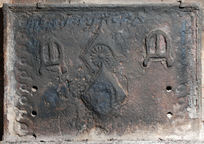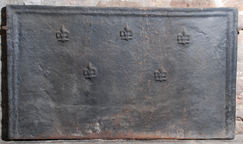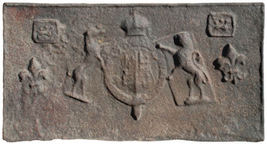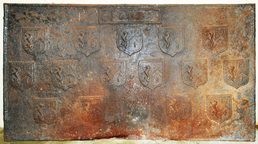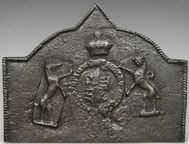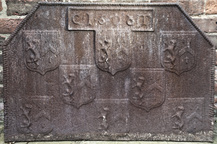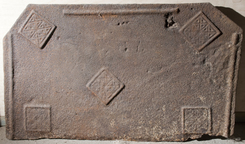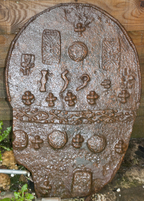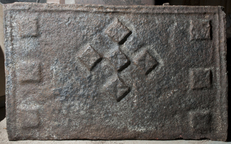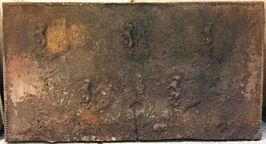-
829
Description: Rectangular; ovolo-moulded edging (top and sides); repeated guilloche pattern inside top and side edges; upper centre, lozenge stamp with ovolo edges and recessed daisy flower in centre, between buckle stamp repeated twice; the lozenge stamp is repeated over-stamping the lower part of the first.
Notes: The lozenge stamp is a design also seen on domestic interior panelling; the buckles suggest a Pelham family association; the buckle and lozenge are separate stamps, and in each example their relative positions differ slightly; the guilloche design appears to have been carved on the base panel; an example at The Star Inn, Alfriston, Sussex measures 665mm x 480mm.
- Decoration tags:
- rectangular (shape)
- ovolo (edging)
- carved stamps
- carved pattern panels
- heraldic
- objects
Manufactured: in the early- to mid-17th century in the Weald area of England.
Current location: in private hands, Iford, East Sussex, England.
- Attached to series:
- Pelham family firebacks
- Pelham buckle and lozenge series
- Metalware stamp firebacks
-
830
Description: Rectangular; stepped fillet moulded edging (top and sides); small fleur-de-lys stamp repeated five times, three centred across the top, two centred across the middle.
Notes: The fleur-de-lys stamp appears to have been constructed using wire.
- Decoration tags:
- rectangular (shape)
- stepped fillet (edging)
- carved stamps
- heraldic
- objects
Manufactured: in the mid- to late-16th century in the Weald area of England.
Current location: in private hands, Iford, East Sussex, England.
- Attached to series:
- Fleur-de-lys firebacks
-
470
Description: Rectangular; twisted rope edging (top and sides); central Tudor royal shield with encircling garter (motto reversed), separate greyhound and lion supporters, separate crown; rectangular bordered stamp with an animal facing to the right, repeated once above and on each side of the armorial; bold fleur-de-lys stamp repeated once on each side of the armorial below the other stamp; all irregularly positioned.
Notes: The armorial and fleurs-de-lys are seen together on a plate at Alfriston Clergy House.
Copies of this fireback are known.
Arms: Tudor royal (prob. Elizabeth I)
- Decoration tags:
- rectangular (shape)
- rope (edging)
- carved stamps
- heraldic
- armorial
- royal
- objects
Manufactured: in the mid- to late-16th century possibly at Pounsley Furnace, Framfield in the Weald area of England.
Current location: not known.
Citation: Lloyd, N., 1925, 'Domestic Ironwork I', Architectural Review, 58, pp. 58-67.
-
699
Description: Rectangular; twisted rope edging on top and sides; cavetto-moulded-edged rectangle top centre, enclosing date between initials; 16 shields of Ayloffe impaling Sulyard in three rows (5-6-5); Ayloffe: sable, a lion rampant Or, collared gules, between three crosses formy of the second; Sulyard: argent, a chevron gules between three pheons inverted sable.
Notes: William Ayloffe (c1535-1584) of Bretons, Hornchurch, Essex, Justice of the Court of Queen’s Bench, married (c1560) Jane, dau. of Sir Eustace Sulyard, of Runwell, Essex. The initials 'CT' are likely to be those of Charles Tyler, a founder whose working life and that of his family have strong parallels with the occurrence of these firebacks. Indentations in the spaces in the upper parts of this fireback appear to impressions of fingers.
Copies of this fireback are known.
Inscription: C.1.6.0.1.T
Arms: Ayloffe impaling Sulyard (William Ayloffe of Bretons, Hornchurch)
- Decoration tags:
- rectangular (shape)
- rope (edging)
- carved stamps
- individual letters
- individual numbers
- armorial
- text
Manufactured: in 1601 possibly at Bedgebury Furnace, Goudhurst in the Weald area of England.
Current location: not known.
- Attached to series:
- Ayloffe series
- Personal armorial firebacks
-
51
Description: Arched rectangular shaped, topped with a triangle; twisted rope edging (top and sides only); inverted Tudor royal shield and Garter, crown above, greyhound and lion supporters (see example at Alfriston Clergy House). Two horizontal planklines.
Notes: A uniquely shaped fireback, the inverted shield and Garter indicate that they formed a separate stamp from the crown; other firebacks with these stamps have the shield and Garter the correct way round. A frequently copied fireback; a larger version has a bottom extension. Inferior copies of this fireback were advertised in Kings Worthy Foundry's (Winchester) catalogue in the mid-20th century.
Copies of this fireback are known.
Inscription: HONE SOVT QUEY MAL Y PENSE
Arms: Tudor royal (prob. Elizabeth I)
- Decoration tags:
- rectangular with round arch and triangle above (shape)
- rope (edging)
- carved stamps
- planklines
- heraldic
- armorial
- royal
Manufactured: in the mid- to late-16th century possibly at Pounsley Furnace, Framfield in the Weald area of England.
Current location: Courtlands, Taunton, Somerset, England.
- Attached to series:
- Pounsley series
- Tudor royal armorial firebacks
- Elizabethan royal greyhound series
-
1315
Description: Canted rectangular shape; twisted rope edging (top and sides); top centre, rectangular panel with cavetto-moulded edging enclosing date between initials CT; below, eight shields of Ayloffe impaling Sulyard in three rows (3-2-3); Ayloffe: sable, a lion rampant Or, collared gules, between three crosses formy of the second; Sulyard: argent, a chevron gules between three pheons inverted sable.
Notes: William Ayloffe (c1535-1584) of Bretons, Hornchurch, Essex, Justice of the Court of Queen’s Bench, married (c1560) Jane, dau. of Sir Eustace Sulyard, of Runwell, Essex. The initials 'CT' are likely to be those of Charles Tyler, a founder whose working life and that of his family have strong parallels with the occurrence of these firebacks. The reversal of the second 6 in the date is, so far, unique in this series.
Inscription: C 1606 T [the second 6 reversed]
Arms: Ayloffe impaling Sulyard (William Ayloffe of Bretons, Hornchurch)
- Decoration tags:
- rectangular with canted top corners (shape)
- rope (edging)
- carved stamps
- individual letters
- individual numbers
- heraldic
- armorial
- text
Manufactured: in 1606 possibly at Bedgebury Furnace, Goudhurst in the Weald area of England.
Current location: in private hands, Tenterden, Kent, England.
- Attached to series:
- Ayloffe series
- Personal armorial firebacks
-
1089
Description: Canted quasi-rectangular shape with no edging; straight length of ?dowel placed parallel to top and to each side; square stamp with fillet edge and four diagonally quartered squares repeated five times, three rotated with sides 45 degrees to the vertical in top corners and slightly left of lower centre, and two, unrotated, repeated twice in bottom corners.
Notes: The square stamps may be pastry moulds.
- Decoration tags:
- rectangular with canted top corners (shape)
- none (edging)
- simple stamps
- carved stamps
- objects
Manufactured: in the mid- to late-16th century in the Weald area of England.
Current location: Authentic Reclamation, Lymden Lane, Ticehurst, East Sussex, England.
- Attached to series:
- Crossed square Wealden series
- Food mould stamp firebacks
-
1090
Description: Fragment; probably originally arched rectangular shape with twisted rope edging (only the arch and a section below surviving); below arch, band of repeated short stamps with undulating vine decoration, randomly impressed so that the undulations do not join consistently; above the band, line of ?crowned cross stamps repeated five times; above them, the date (the 3 uncertain) between two vertically-aligned stamps formed of a double figure-of-eight between opposed concave curves; above, a rose stamp between two vertical rectangular stamps of indeterminate design, with a ?crowned rose stamp above; below the band, a line of alternate rose and ?crowned cross stamps, three of each; below, a ?crowned cross stamp and a rectangular stamp.
Notes: Most of the stamps have been seen on a small group of firebacks of the 1590s concentrated in the western Weald.
Inscription: 1593[?]
- Decoration tags:
- rope (edging)
- carved stamps
- individual numbers
- text
- plants
- objects
Manufactured: in 1593 in the Weald area of England.
Current location: in private hands, Ticehurst, East Sussex, England.
- Attached to series:
- Loop stamp (early) series
-
1103
Description: Rectangular shape; double astragal edging (top and sides); arrangement of repeated square stamps with indented saltires: three down each side, five in a diamond pattern top centre.
Notes: The lines around the edge may well have been formed from impressing a straight edge of some sort.
- Decoration tags:
- rectangular (shape)
- double astragal (edging)
- carved stamps
- objects
Manufactured: in the mid- to late-16th century in the Weald area of England.
Current location: Authentic Reclamation, Lymden Lane, Ticehurst, East Sussex, England.
- Attached to series:
- Miscellaneous stamp firebacks
-
1066
Description: Rectangular; twisted rope edging (top and sides only); five shields of Ayloffe impaling Sulyard in two rows, 3-2; Ayloffe: sable, a lion rampant Or, collared gules, between three crosses formy of the second; Sulyard: argent, a chevron gules between three pheons inverted sable.
Notes: William Ayloffe (c1535-1584) of Bretons, Hornchurch, Essex, Justice of the Court of Queen’s Bench, married (c1560) Jane, dau. of Sir Eustace Sulyard, of Runwell, Essex.
Arms: Ayloffe impaling Sulyard (William Ayloffe of Bretons, Hornchurch)
- Decoration tags:
- rectangular (shape)
- rope (edging)
- carved stamps
- heraldic
- armorial
Manufactured: in the early-17th century in the Weald area of England.
Current location: not known.
- Attached to series:
- Ayloffe series
- Personal armorial firebacks
